A secretly negotiated agreement between the US and China to lower greenhouse-gas output faced a wall of opposition on Wednesday from Republicans in Washington, who threatened to use their control of both houses of Congress to thwart the plan.
Under the deal, unveiled unexpectedly in Beijing early on Wednesday, China committed for the first time to cap its output of carbon pollution by 2030. Beijing also promised to increase its use of zero-emission energy sources, such as wind and solar power, to 20% by 2030.
The United States agreed to double the pace of the cuts in its emissions, reducing them to between 26% and 28% below 2005 levels by 2025.
The deal struck between President Barack Obama and his Chinese counterpart, Xi Jinping, provides an important boost to efforts to reach a global deal to fight climate change at a United Nations meeting in Paris next year. The accord also removes the Republicans’ main rationale for blocking Obama’s efforts to cut carbon pollution – the claim that China is unwilling to undertake similar cuts.
But Republicans in the US Congress reacted strongly against the deal on Wednesday. The party already held a majority in the House of Representatives, and the midterm elections last week also delivered them control of the Senate, where the Republican leader, Mitch McConnell, said Obama would not be in the White House long enough to see the plan through.
“This unrealistic plan, that the president would dump on his successor, would ensure higher utility rates and far fewer jobs,” he said.
In his first meeting with the incoming Republican majority, McConnell, who represents the coal state of Kentucky, said he was “distressed” at the deal, adding that the diplomatic breakthrough would have no effect on his disdain for international climate negotiations.
“As I read the agreement it requires the Chinese to do nothing at all for 16 years while these carbon emissions regulations are creating havoc in my state and around the country,” he said.
The Republican speaker of the House, John Boehner, also attacked the deal, and suggested he would move legislation to further limit Obama’s ability to deliver the carbon pollution cuts he promised.
The White House has said the US can deliver the promised reductions in greenhouse gas emissions through existing regulations, including the Environmental Protection Agency’s new rules for power plants, which are the core of Obama’s climate agenda.
But Boehner said: “Republicans have consistently passed legislation to rein in the EPA and stop these harmful policies from taking effect, and we will continue to make this a priority in the new Congress.”
Jim Inhofe, the Oklahoma Republican and climate denier who is poised to take over the Senate environment and public works committee in January, said China’s end of the bargain was just a ploy to buy time.
“It’s hollow and not believable for China to claim it will shift 20% of its energy to non-fossil fuels by 2030 and a promise to peak its carbon emissions only allows the world’s largest economy to buy time,” he said. “As we enter a new Congress I will do everything in my power to rein in and shed light on the EPA’s unchecked regulations.”
President Obama hailed the deal at a joint press conference with his Chinese counterpart at the Great Hall of the People. “As the world’s largest economies and greatest emitters of greenhouse gases we have special responsibility to lead the global effort against climate change,” he said. “I am proud we can announce a historic agreement. I commend President Xi, his team and the Chinese government for the commitment they are making to slow, peak and then reverse China’s carbon emissions.”
President Xi said: “We agreed to make sure international climate change negotiations will reach agreement as scheduled at the Paris conference in 2015 and agreed to deepen practical cooperation on clean energy, environmental protection and other areas.”
The early opposition in Washington raised questions about whether the US and China will be able to deliver on their respective commitments. Obama administration officials argue the new US target is achievable under existing laws.
But with Republicans in control of Congress, there is virtually no prospect of new climate legislation, and there could be delays that would weaken regulations put in place by the EPA before they come into force. “The US target looks like it’s going to be really tough to meet without new laws,” Michael Levi, an energy and environment fellow at the Council on Foreign Relations, wrote in a blog post.
“The EPA power plant rules as they’re currently proposed are already spurring plenty of pushback; pressing them further will be a tall political and technical task. In particular, it’s near-impossible to imagine achieving these goals simply with actions taken during the Obama administration. President Obama’s administration may have developed and negotiated these numbers, but his successor will determine whether they’re achieved.”
China also faces technical challenges to reaching its targets.
The White House said in a statement that China could reach peak emissions even earlier than 2030 “based on its broad economic reform programme, plans to address air pollution and implementation of President Xi’s call for an energy revolution”.
But the White House acknowledged it would be more difficult for China to scale up to 20% energy from zero-emission sources by 2030.
“It will require China to deploy an additional 800-1,000 gigawatts of nuclear, wind, solar and other zero-emission generation capacity by 2030 – more than all the coal-fired power plants that exist in China today and close to total current electricity generation capacity in the United States,” the White House said.
Some campaign groups also pointed out that the agreement – while ambitious – still did not go as far as scientists say is needed to limit dangerous warming.
The European Union has already endorsed a binding 40% greenhouse gas emissions reduction target by 2030.
Diplomats said they hoped that the US-China deal would provide momentum to climate negotiations.
Officials are to meet in Lima at the end of the month to begin the last phase of negotiations for a global deal to cut emissions in Paris. As part of those talks, countries will also be preparing to put forward their own targets for cutting emissions by early 2015.
Herman Van Rompuy, the president of the European Council, and Jean-Claude Juncker, the European Commission president, urged other countries to show their hand on emissions cuts: “We welcome the announcement today by the presidents of the United States and China on their respective post-2020 actions on climate change.
“The announcements to date cover around half of the global emissions. We urge others, especially the G20 members, to announce their targets in the first half of 2015 and transparently. Only then we can assess together if our collective efforts will allow us to fulfil the goal of keeping global temperature increases well below 2C.”
Tao Wang, climate scholar at the Tsinghua-Carnegie Center for Global Policy in Beijing, said: “It is a very good sign for both countries and injects strong momentum [into negotiations] but the targets are not ambitious enough and there is room for both countries to negotiate an improvement.
“That figure isn’t high because China aims to reach about 15% by 2020, so it is only a five percentage point increase in 10 years, and given the huge growth in renewables it should be higher.”
Andrew Steer, president of the World Resources Institute, which promotes sustainable resource management, said the announcements would “inject a jolt of momentum in the lead-up to a global climate agreement in Paris”.
“It’s a new day to have the leaders of the US and China stand shoulder to shoulder and make significant commitments to curb their country’s emissions,” he said.
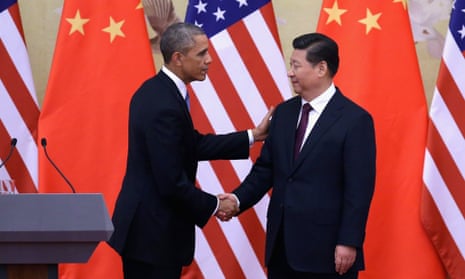
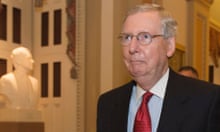

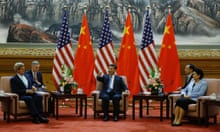
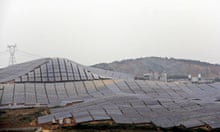
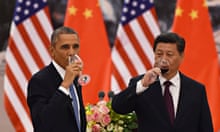
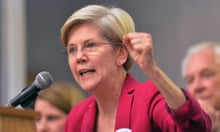
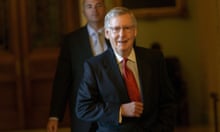
Comments (…)
Sign in or create your Guardian account to join the discussion